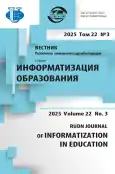Methodology of multilevel personalized programming teaching in basic school
- 作者: Samylkina N.N.1, Mishin V.A.1
-
隶属关系:
- Moscow Pedagogical State University
- 期: 卷 22, 编号 3 (2025)
- 页面: 268-287
- 栏目: TEACHING COMPUTER SCIENCE
- URL: https://journal-vniispk.ru/2312-8631/article/view/321323
- DOI: https://doi.org/10.22363/2312-8631-2025-22-3-268-287
- EDN: https://elibrary.ru/QFHVFN
- ID: 321323
如何引用文章
全文:
详细
Problem statement. Educational standards in Russia and abroad are being updated by strengthening the role of programming and data analysis using intelligent tools. Digitalization of all sectors of the economy, which requires new approaches to personnel training, leads to early profiling in general education as a basis for training qualified specialists required by the IT industry. Solving the problem of multilevel programming education using digital resources with an intellectual component is an important step in improving the quality of education, developing digital competencies of schoolchildren and creating the necessary conditions for all students to master programming as a basis for future professional competencies. Methodology . In the work we applied general scientific methods of research: theoretical and experimental. Such as, theoretical analysis, comparison and generalization of scientific and pedagogical research, psychological, pedagogical, philosophical, scientific, technical and methodological literature on the research problem; analysis and specification of legislative acts in the field of education, educational standards of different levels of education, curricula for general education, textbooks, teaching aids, problem books and methodological materials on general education course of informatics and methods of its mastering. The following methods were used during the experimental work: focus groups, expert assessments and statistical methods based on the theory of measurements. Results . The authors have substantiated and developed a methodology for multi-level programming education in the general education computer science curriculum, in accordance with the updated FSES requirements. Conclusion . The developed methodology, based on an integrative approach and aligned with the updated FSES for general education, will enable educational institutions to design various personalized learning trajectories for programming education.
作者简介
Nadezhda Samylkina
Moscow Pedagogical State University
编辑信件的主要联系方式.
Email: nsamylkina@yandex.ru
ORCID iD: 0000-0003-0797-5532
SPIN 代码: 5599-8846
Doctor of Pedagogical Sciences, Associate Professor, Professor of the Department of Theory and Methodology of Informatics Education, Institute of Mathematics and Informatics
1 Malaya Pirogovskaya St, Moscow, 119571, Russian FederationVadim Mishin
Moscow Pedagogical State University
Email: vadim.mishin.work@mail.ru
ORCID iD: 0009-0002-3090-0010
SPIN 代码: 5722-2051
PhD Student of the Department of Theory and Methodology of Informatics Education, Institute of Mathematics and Informatics
1 Malaya Pirogovskaya St, Moscow, 119571, Russian Federation参考
- Vuorikari R, Punie Y, Carretero Gomez S, Van Den Brande G. DigComp 2.0: The digital competence framework for citizens. Update phase 1: the conceptual reference model. Report number: EUR 27948 EN. Luxembourg: Publications Office of the European Union, 2016.
- Sang JL, Kyungbin K. A systematic review of AI education in K-12 classrooms from 2018 to 2023: topics, strategies, and learning outcomes. Computers and Education: Artificial Intelligence. 2024;6(1):100211. https://doi.org/10.1016/j.caeai.2024.100211
- Hazzan O, Ragonis N, Lapidot T. Data science and computer science education. In: Ragonis N. (ed.) Guide to Teaching Computer Science. Cham: Springer; 2020.
- Hammers E. National Academies of Sciences, Engineering, and Medicine. Foundations of Data Science for Students in Grades K-12: Proceedings of a Workshop. Washington, DC: The National Academies Press; 2023. 152 p. https://doi.org/10.17226/26852
- Israel-Fishelson R, Moon PF, Tabak R, Weintrop D. Preparing students to meet their data: an evaluation of K-12 data science tools. Behaviour & Information Technology. 2023;44(4):1–20. https://doi.org/10.1080/0144929X.2023.2295956
- Bellettini C, Lonati V, Malchiodi D, Monga M, Morpurgo A, Torelli M, Zecca L. Informatics education in Italian secondary schools. ACM Transactions on Computing Education. 2014;14(2):15.1–15.6. https://doi.org/10.1145/2602490
- Gal-Ezer J, Stephenson C. A tale of two countries: Successes and challenges in K-12 computer science education in Israel and the United States. ACM Transactions on Computing Education. 2014;14(2):1–18. https://doi.org/10.1145/2602483
- Raman R, Venkatasubramanian S, Krishnashree K, Nedungadi P. Computer Science (CS) education in Indian schools: situation analysis using darmstadt model. ACM Transactions on Computing Education. 2015;15(2):1–36. https://doi.org/10.1145/2716325
- Uvarov AYu, Frumina ID. (eds.) Challenges and prospects of digital transforma tion. Moscow: HSE Publishing House; 2019. Available from: https://ioe.hse.ru/data/2019/07/01/1492988034/Cifra_text.pdf (accussed: 05.03.2025). (In Russ.) EDN: ANYGHO
- Samylkina NN. Organization of advanced training in informatics on the basis of integrative approach: monograph. Moscow: MPGU; 2020. (In Russ.) EDN: YZMPYM
- Bosova LL, Samylkina NN, Bosova AYu. Formative assessment of educational results of students in informatics in basic school. Informatics at School. 2024;(2):4–16. (In Russ.) https://doi.org/10.32517/2221-1993-2024-23-2-4-16 EDN: AAMOKX
- Karavaev NL, Soboleva EV. Analysis of software services and platforms with the potential for gamification of learning. Concept. 2017;(8):14–25. (In Russ.) EDN: ZEGUJZ
- Gabdullina ASh, Rubtsova AV. Gamification as a means of developing flexible skills and creative thinking in teaching a foreign language. Concept. 2024;(2):1–12. (In Russ.) EDN: ICTWJA
- Efremova NF. Gamified assessment of educational achievements of students. Concept. 2024;(1):119–131. (In Russ.) EDN: RDPVPF
- Tikhomirova D, Tregubova A, Ternikov A. Gamification in education and demand for acquired skills: a systematic review. Voprosy obrazovaniya = Educational Studies Moscow. 2024;1(3):151–179. EDN: JBXMGA
- Polyakova VA, Kozlov OA. Impact of gamification on the information and educational environment of the school. Modern Problems of Science and Education. 2015;(5):513–513. (In Russ.) EDN: FNRTTQ
- Mosina MA. Tools of formative assessment in the practice of modern school. Humanities Research. Pedagogy and Psychology. 2020;(1):18–27. (In Russ.) EDN: LEKHSG
- Levchenko IV, Sadykova AR, Merenkova PA. A model of variant teaching for basic school students in the field of artificial intelligence. Informatics and Education. 2024;39(2):16-24 (In Russ.) https://doi.org/10.32517/0234-0453-2024-39-2-16-24 EDN: ENHDAV
- Bosova LL, Samylkina NN, Mishin VA. About multilevel teaching of programming in the course of computer science of the basic school in the conditions of differentiation of the content of education. Teachers XXI Century. 2024;(1):253–273. (In Russ.) EDN: SVVVUO
- Mishin VA. Using the platform MinecrAft: Education Edition at computer science lessons. Informatics at School. 2021;(3):50–59. https://doi.org/10.32517/2221-19932021-20-3-50-59 EDN: SJCQSM
补充文件









